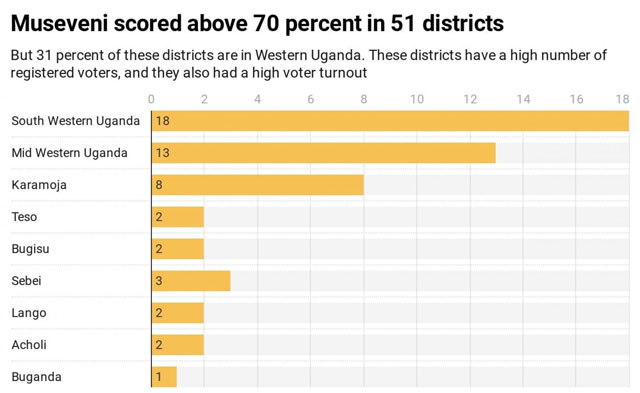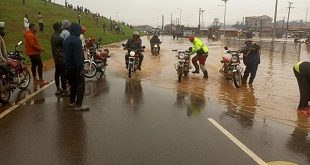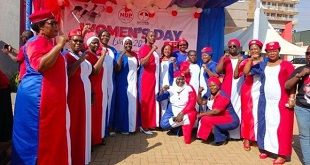
Kiruhura, Uganda | THE INDEPENDENT | President Museveni scored more than 70 percent in 51 districts, polling 2.69 million votes of the 3.21 million valid votes cast in these districts.
This score represents about 44 percent of 6.04 million votes Museveni polled in the January 14th presidential, according to final presidential election results released by the Electoral Commission today. These are districts that delivered the winning ticket to president Museveni who has been in power for 35 years to extend his presidency to 40 years.
And 31 of these districts are in western Uganda. They include districts such as Kiruhura—the president’s home district—where he scored 98.7 percent, and Kazo—curved out of Kiruhura—where he scored 98 percent.
Museveni scored above 90 percent in the districts of Karamoja such as Napak, Nakapiripirit, Amudat and Karenga. The president has traditionally won these districts. He also scored above 90 percent in western districts of Kamwenge, Isingiro and Kisoro.
Interestingly, the districts Museveni won are also the districts that registered highest voter turnout. For instance, Kiruhura had a 93 percent voter turnout, Kazo 81, Kamwenge 78 percent and Isingiro 87 percent. In the 2016 presidential election, Kiruhura (Kazo was part of it) had 86 percent voter turnout, Kamwenge 71 percent and Insigiro 70 percent.
There have been allegations of ballot stuffing in western Uganda: video clips of people ticking more than one ballot papers, speaking Runyankole have been circulating online. The Electoral Commission chairperson, Simon Byabakama says they canceled results of 83 polling stations because of allegations of ballot stuffing, grabbing of polling materials, declaration of result (DR) not being delivered, total votes cast exceeding number of registered voters and acts of hooliganism.
But most of these polling stations where results were canceled such as Kampala, Wakiso and Mukono were won by Bobi Wine. Its only Sembabule, won by Museveni where Electoral Commission canceled results of a number of polling stations. In western Uganda, the commission annulled results of two polling stations: one in Isingiro and another in Bundibugyo.
Contrary to Karamoja, the western Uganda districts were consequential in handing Museveni victory due to high number of registered voters. This voter turnout was vital in this election where national voter turnout was 59.3 percent, according to election data. Its only one Buganda district-Lyantonde where Museveni scored above 70 percent.
Interestingly also, Museveni’s closest challenger—pop-start turned politician—Robert Kyagulanyi lost heavily in districts with a high voter turnout. He only scored above 20 percent in two districts that registered more than 70 percent turnout: Butebo and Bulambuli.
Bobi Wine’s best score in a district with high voter turnout is Gomba where he polled 53 percent and the district had 68 voter turnout, Butambala where he polled 73 percent and the district had 67 percent voter turnout, Mityana where he won with 64 percent and the district had 65 percent voter turnout.
Districts that had a high number of registered voters and won by Bobi Wine such as Kampala and Wakiso had less than 50 percent voter turnout.
Museveni has always won
Western Uganda is a region Museveni has been winning for years. For the four times that Forum for Democratic Change (FDC’s) Dr Kizza Besigye challenged Museveni, he won only two districts in western Uganda—Kasese (2006 and 2016) and Rukungiri—his home district in 2016. Apart from these districts, Besigye managed to poll more than 30 percent only in Mitooma, Ntungamo and Kabale districts in 2016 election.
Prior to Jan 14th election, Bernard Sabiti, a researcher and public policy analyst argued Museveni has had a substantial support in western Uganda over years that disadvantaged the opposition. “It is being naïve to say Museveni has no support at all. That is not true. There is genuine support for the president especially in the countryside and particularly in western Uganda.”
Both Sabiti and Mwambutsya Ndebeesa, a political scientist at Makerere University argued that NRM has leveraged patronage and state machinery to tempt politicians who walk away back into its fold but also frustrate organizational capabilities of opposition parties in western Uganda.
********
URN
 The Independent Uganda: You get the Truth we Pay the Price
The Independent Uganda: You get the Truth we Pay the Price



